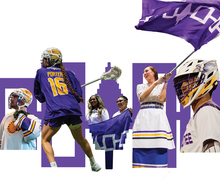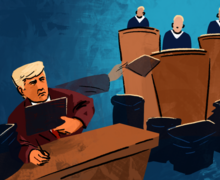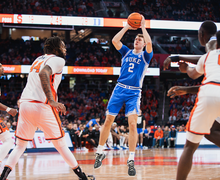Anti-Defamation League says series of hate, bias incidents is “incredibly concerning”
Corey Henry | Photo Editor
There is always a potentialfor the verbal and written incidents to lead to physical violence, Bernstein said.
The Anti-Defamation League has expressed concern about the 12 hate crimes and bias-related incidents that have occurred on or near the Syracuse University campus in the past 13 days.
Swastikas, racist graffiti and racial slurs have been etched, written and yelled throughout SU’s campus since Nov. 7. The white supremacist memo of the Christchurch mosque shooter, which contains Neo-Nazi and anti-immigrant ideology, was sent to students’ cellphones Tuesday night. The hate crimes and bias-related incidents have targeted black, Asian and Jewish people.
“The series of incidents that took place, especially in such a short period of time, is incredibly concerning to us at the ADL,” said Evan Bernstein, the ADL’s New York/New Jersey regional director. The ADL is an anti-hate organization established to combat anti-Semitism that now fights against all types of hate.
College campuses are supposed to be places of learning, open thought and cohesion among others, Bernstein said. There has been an uptick in hate crimes and bias-related incidents on college campuses across the country since the 2016 election of President Donald Trump, he said. About 280 campus hate crimes were reported to the FBI in 2017, according to the Chronicle of Higher Education.
The country is beginning to see a “normalization of hate,” Bernstein said.
After the white supremacist manifesto was posted online and sent to students at Bird Library, several SU professors and departments canceled their classes. The Quad was empty Tuesday morning, and some students contacted their professors to express concern about walking to class alone.
There is always potential for the verbal and written incidents to lead to physical violence, Bernstein said. Now that SU and its students are aware of the incidents, they can hopefully come together to prevent such an escalation, he said.
Even if the hate crimes and bias-related incidents don’t involve physical harm, the incidents are still “incredibly hurtful,” Bernstein said.
“Words hurt and words matter, and when someone is called a horrific racial slur, that impacts not only the individual, it impacts the entire campus community and other minority groups on campus,” he said.
White supremacist recruitment has occurred in the upstate New York region, including on college campuses, Bernstein said. The recruitment sometimes targets lone wolves instead of larger groups — individual actors have been seen to do lots of damage, he said. He referenced the October 2018 shooting at the Tree of Life synagogue in Pittsburgh.
SU’s response to the hate crimes and bias-related incidents can’t be “one and done,” he said. Measures need to be taken to change the campus climate and ensure such events don’t happen in the future. The ADL knows the incidents are being addressed by the university, as well as local elected officials and law enforcement, he said.
The university should develop a formal strategic plan to address hate crimes and bias-related incidents, Bernstein said. SU must work proactively and with “unparalleled collaboration” from administration, faculty and staff to create, fund and implement the plan. There needs to be unity among students, staff and faculty.
For seven days, students have held a sit-in at the Barnes Center at The Arch to protest the hate crimes and bias-related incidents. The protesters, who have adopted the name #NotAgainSU, presented Chancellor Kent Syverud with a list of 18 demands aimed at protecting minority students and changing campus culture.
The protesters are demanding that the university implement a zero-tolerance harassment policy. Syverud has said SU will work to revise its existing policy in the Code of Student Conduct for clarity.
The ADL is a firm supporter of free speech but knows that hate speech can’t go unaddressed, Bernstein said. He encouraged campus leaders and officials to speak out when hateful rhetoric comes to campus.
#NotAgainSU, a movement led by black students, has stood in solidarity with Asian, Jewish and international students who have also been affected by the campus hate crimes and bias-related incidents.
Many minority groups are subject to a tremendous amount of hate, but they sometimes work in silos, Bernstein said. Now’s the time for people of all minority identities to unify — if someone hates one minority group, they probably hate others, he said.
“Use that as an opportunity to come together to push back on this and make as much change as possible,” Bernstein said.
Published on November 19, 2019 at 11:59 pm
Contact Emma: esfolts@syr.edu





